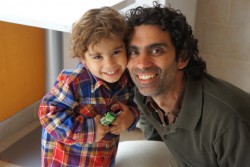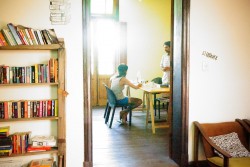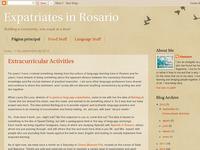- Home » Expat Articles » Interviews » American Expat Living in Argentina - Interview with Stephanie
American Expat Living in Argentina - Interview with Stephanie
| Published: | 3 Oct at 10 AM |
Want to get involved?
Become a Featured Expat and take our interview.
Become a Local Expert and contribute articles.
Get in touch today!
Become a Local Expert and contribute articles.
Get in touch today!
Filed: Interviews,Argentina
Stephanie is a U.S. expat who found her heart in Argentina. She is a lover of life, a mother and wife, and the founder of Spanish in Rosario, a Spanish language school located in her current city, Rosario, Argentina. Stephanie's expat blog is called Expatriates in Rosario (see listing here)
Where are you originally from?
I am originally from a small "blink and you'll miss it" desert town in southern California. It's called Yucca Valley, but you have probably never heard of it.
In which country and city are you living now?
I currently live in Rosario, Argentina; Cradle to the Argentinean flag, birth place of Che Guevara and National Capital of Ice Cream.
How long have you lived in Argentina and how long are you planning to stay?
I have lived here for nearly 9 years now and honestly, at the moment, I don't see a move in my near future.
Why did you move to Argentina and what do you do?
I moved to Rosario after meeting who is now my husband and the father of my soon to be 2 children. We met on the Inca trail to Machu Picchu. He invited me to visit Rosario and I didn't skip a beat in coming, some 2 weeks later I was here to "see about a man," and never left. At that point, I was in my final year of University studying Sociology and was working as a bartender in San Francisco, California. Upon arriving to Rosario I wasn't sure what I was going to do. My first priority was to learn Spanish, only there wasn't, at that time, a school in which to do so. I took that as a sign and decided that I would start one. Today I am the founder and director of Spanish in Rosario, a Spanish language school for travelers. But I do a bit of everything these days: teach English, translate, edit and interpret, as well as, organize cultural events based on language and cultural exchange.
Did you bring family with you?
I didn't have a family at that time. So, rather than bringing my family with me, I stayed here and made one of my own.
How did you find the transition to living in a foreign country?
The transition was not easy, mostly because of my sudden lack of community and inability to develop a new one due to the language barrier that stood between myself and the locals.
Was it easy making friends and meeting people; do you mainly socialise with other expats?
As I sort of mentioned above, making friends was not easy. Looking back on this, I think it is mainly based on two things: language and culture. What do I mean? Well, in Argentina family plays a huge roll and friends are like a second family. This second family follows you through life. It is not that these groups are unfriendly, on the contrary, they are warm and inviting, however, it is very difficult to integrate into a group of friends that shares 20 years of friendship filled inside jokes and history that, to a new comer, might make them feel even more like an outsider. So, initially, yes, I spent a good deal of time with expats.
What are the best things to do in the area; anything to recommend to future expats?
I once wrote an article titled, "Rosario is Not for Tourists." This is because, when you ask me what there is to do here, I am hard pressed to find a landmark or activity that is am absolute must. With that being said, Rosario does have its encanto, as they say. There is something warm and inviting about the city, the food, the nightlife, the desire to be outside on an even remotely sunny day, and of course, the people. So, I guess I would recommend settling in, allowing Rosario to grow on you and steer clear of the expat tendency to compare. Let Rosario be Rosario, love it for what it is, and not for what it isn't.
What do you enjoy most about living in Argentina?
Definitely mate. Mate is a kind of cultural green tea that is shared between friends, but it is so much more than that. It is an excuse to see your friends, it is a conversation starter, it creates an sort of intimacy in the act of sharing. It is amazing.
How does the cost of living in Argentina compare to home?
Today, the cost of living is probably pretty similar to home, with the derailing of the dollar and the tendency for inflation, I am not sure it is much cheaper than the US. But there are things that contribute to the over all quality of life, like healthcare and education, both of which are paid for by the tax payers.
What negatives, if any, are there to living in Argentina?
There are loads, just like with any place you live. But, in Argentina in general, one of the downsides is the lack of imported goods. Things like maple syrup and peanut butter are nonexistent and the import goods that do make it into the country are 2-3 times more expensive.
If you could pick one piece of advice to anyone moving to Argentina, what would it be?
Learn the language.
What has been the hardest aspect to your expat experience so far?
The most difficult experience I have had so far is knowing that, economically, I can only swing visiting my family once a year.
When you finally return home, how do you think you'll cope with repatriation?
I am not sure I will ever find myself living back on U.S. soil, but in the case that I do, I think I will struggle greatly with so many things. For example, not being able to call the doctor in the middle of the night when my son has a fever, having to start University funds for both of my kids, going from having slim pickins in the way of food items to having way more than the mind should ever have to process...I could go on, but I digress.
What are your top 5 expat tips for anyone following in your footsteps?
Expatriates in Rosario is designed to building community in and among the short stay traveler and long stay expat.
How can you be contacted for further advice to future expats coming to your area?
You can always contact me via the expat blog or Spanish in Rosario's website.
Here's the interview with Stephanie...
Where are you originally from?
I am originally from a small "blink and you'll miss it" desert town in southern California. It's called Yucca Valley, but you have probably never heard of it.
In which country and city are you living now?
I currently live in Rosario, Argentina; Cradle to the Argentinean flag, birth place of Che Guevara and National Capital of Ice Cream.
How long have you lived in Argentina and how long are you planning to stay?
I have lived here for nearly 9 years now and honestly, at the moment, I don't see a move in my near future.
Why did you move to Argentina and what do you do?
I moved to Rosario after meeting who is now my husband and the father of my soon to be 2 children. We met on the Inca trail to Machu Picchu. He invited me to visit Rosario and I didn't skip a beat in coming, some 2 weeks later I was here to "see about a man," and never left. At that point, I was in my final year of University studying Sociology and was working as a bartender in San Francisco, California. Upon arriving to Rosario I wasn't sure what I was going to do. My first priority was to learn Spanish, only there wasn't, at that time, a school in which to do so. I took that as a sign and decided that I would start one. Today I am the founder and director of Spanish in Rosario, a Spanish language school for travelers. But I do a bit of everything these days: teach English, translate, edit and interpret, as well as, organize cultural events based on language and cultural exchange.
Did you bring family with you?
I didn't have a family at that time. So, rather than bringing my family with me, I stayed here and made one of my own.
How did you find the transition to living in a foreign country?
The transition was not easy, mostly because of my sudden lack of community and inability to develop a new one due to the language barrier that stood between myself and the locals.
Was it easy making friends and meeting people; do you mainly socialise with other expats?
As I sort of mentioned above, making friends was not easy. Looking back on this, I think it is mainly based on two things: language and culture. What do I mean? Well, in Argentina family plays a huge roll and friends are like a second family. This second family follows you through life. It is not that these groups are unfriendly, on the contrary, they are warm and inviting, however, it is very difficult to integrate into a group of friends that shares 20 years of friendship filled inside jokes and history that, to a new comer, might make them feel even more like an outsider. So, initially, yes, I spent a good deal of time with expats.
What are the best things to do in the area; anything to recommend to future expats?
I once wrote an article titled, "Rosario is Not for Tourists." This is because, when you ask me what there is to do here, I am hard pressed to find a landmark or activity that is am absolute must. With that being said, Rosario does have its encanto, as they say. There is something warm and inviting about the city, the food, the nightlife, the desire to be outside on an even remotely sunny day, and of course, the people. So, I guess I would recommend settling in, allowing Rosario to grow on you and steer clear of the expat tendency to compare. Let Rosario be Rosario, love it for what it is, and not for what it isn't.
What do you enjoy most about living in Argentina?
Definitely mate. Mate is a kind of cultural green tea that is shared between friends, but it is so much more than that. It is an excuse to see your friends, it is a conversation starter, it creates an sort of intimacy in the act of sharing. It is amazing.
How does the cost of living in Argentina compare to home?
Today, the cost of living is probably pretty similar to home, with the derailing of the dollar and the tendency for inflation, I am not sure it is much cheaper than the US. But there are things that contribute to the over all quality of life, like healthcare and education, both of which are paid for by the tax payers.
What negatives, if any, are there to living in Argentina?
There are loads, just like with any place you live. But, in Argentina in general, one of the downsides is the lack of imported goods. Things like maple syrup and peanut butter are nonexistent and the import goods that do make it into the country are 2-3 times more expensive.
If you could pick one piece of advice to anyone moving to Argentina, what would it be?
Learn the language.
What has been the hardest aspect to your expat experience so far?
The most difficult experience I have had so far is knowing that, economically, I can only swing visiting my family once a year.
When you finally return home, how do you think you'll cope with repatriation?
I am not sure I will ever find myself living back on U.S. soil, but in the case that I do, I think I will struggle greatly with so many things. For example, not being able to call the doctor in the middle of the night when my son has a fever, having to start University funds for both of my kids, going from having slim pickins in the way of food items to having way more than the mind should ever have to process...I could go on, but I digress.
What are your top 5 expat tips for anyone following in your footsteps?
- Learn the language.
- Keep an open mind.
- Stay positive.
- Make friends with the locals and the expats. Expats leave, locals stay. You will need some stability.
- Make and effort to maintain cultural traditions whereby inviting the locals to participate in something different and perhaps new.
Expatriates in Rosario is designed to building community in and among the short stay traveler and long stay expat.
How can you be contacted for further advice to future expats coming to your area?
You can always contact me via the expat blog or Spanish in Rosario's website.
Grab a featured expat badge that links to this interview!
 Copy and paste code to display the Featured Expat Badge:
Copy and paste code to display the Featured Expat Badge:Comments » No published comments just yet for this article...
Feel free to have your say on this item. Go on... be the first!




 Stephanie is an American expat living in Argentina. Blog description: Expatriates in Rosario -
Building a community, one expat at a time!
Stephanie is an American expat living in Argentina. Blog description: Expatriates in Rosario -
Building a community, one expat at a time!





